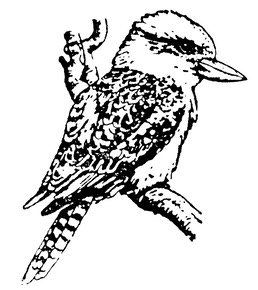
I have had parrots for my entire life. G.G., one of my personal pets, a Severe Macaw, has lived with me since 1988. He went to college with me, and has been through a divorce, and a new marriage. Through all of these life changes, he has lived in many abodes and shared his life with several other people and pets along the way. We have never been evicted because of his noise, even though he is not what most would consider to be a quiet parrot.
In his first years with me, we were at college. This is the point in my life where my bird and I first experienced apartment living. I knew that G.G. and I should be away from other people because of his noise. The distance was necessary to avoid annoyance of neighbors, and probably an eventual eviction. With all of these things in mind, I went looking for a corner or end unit, so that he would not have to share common walls with other people.
When I moved into my new corner apartment, I placed G.G.'s cage as far away from the other apartments as possible. When he did have his noisy times, this allowed his voice to shout out into the common area that really didn't pass through other apartments. The upstairs neighbors could hear him, but they had a yappy dog, so they didn't complain. I learned then that an upstairs unit is better because the vocalizations tend to travel up as well as out. I also tried to look for neighbors who had pets of their own. Pet owners, of most kinds, don't mind the noise of a bird from time to time. On a related note, I did find out that most apartments do not require a pet deposit for birds. As birds become more popular and cause damage to apartments, pet deposits will probably become more common for bird owners.
When G.G. and I lived in quieter living quarters, I would leave the TV or radio on during the day. This would keep G.G. company as well as mask any noise he would make. Another good trick I discovered was to feed the wild birds outside the apartment. I found that most people could not tell the difference between the calls of the wild birds and my pet parrot. Another benefit of feeding the wild birds, is that the wild birds tend to be noisy the same times that my parrot was. I was amazed by the amount of people who were surprised I had a parrot living with me. They had never heard him, or at least they thought they hadn't.
Keeping bird safe plants in the room is another trick I learned. The plants help muffle his noise as well as keep the room's humidity up. I am always amazed when I remove the plants from the room for watering, how much more noisy my bird sounds. Curtains on the windows are yet another way to muffle his noises. The curtains allowed me to regulate G.G.'s sleeping as well. He received ten to twelve hours of sleep at night to avoid a cranky parrot, and he did not wake up at the crack of dawn to disturb anyone.
I exercised and let him be rowdy at times that would not upset other people. I turned the radio up and sang with him around five to six PM at night, which most people didn't even notice. We did birdie aerobics at this time at night too. He would flap up and down on my arm until his breathing increased greatly. When we finished with all this noise and exercise he was quiet for most of the evening. I am not a big fan of covering the cage to stifle a parrot's noise. In most cases, they will develop a nonstop screaming problem. I do, however, think you can control when their noisy times will be, by letting them be their rowdy selves at set times of the day. G.G. always looks forward to this time of day, which generally lasts from thirty minutes to an hour. Note: This time can change if it bothers a particular neighbor. Find out when they aren't home and let your parrot be noisy then.
Bathing and playing can help keep your parrots quiet. After a bath, G.G. has been known to preen for hours. A new toy is also a sure way to keep him quiet. The more intricate, and the more things on the toy to shred, the toy the better. Though, if all else fails, when we are having a noisy moment, shredded paper is great. I always leave this as a last resort. If I give paper to him all the time, then it doesn't work. He gets bored with it.
As far as keeping the carpets clean, I always had my parrot's cages on some sort of a mat. The mats that you use for under office chairs are almost the perfect size for a medium size cage. Later on, when my Goldie's Lorikeet came to live with us, I saw how mats were a necessity. Tile floors are preferable with Lorys if at all possible, but apartments almost always have carpet. A good steam cleaner is almost a must when parrots live in carpet environments. I have both a regular size steam cleaner and a hand held model, and find that each type is well suited to different aspects of parrot cleanup. Steam cleaners are indispensable with Lories, especially. I also found that "Poop Off" cleaning solution will get just about any bird mess off the carpet and the little scrubby end on the bottle can work miracles.
Always be careful with the placement of your parrot's cage. A cage with some sort of skirt or seed guard will help guide your placement. You don't want your parrot to chew any walls, molding, or anything else that he shouldn't. Try to keep your parrot at least six inches away from any wall. It is very important that your parrot doesn't damage anything in an apartment and if he does that you fix it completely. If apartment complexes feel that to many units have been damaged by parrots, they will either not allow them in the future or have hefty deposits.
If you are in an apartment, and are thinking of getting a medium to large parrot, please wait until you can find an apartment that is more appropriate for the parrot of your choice. I hear of so many people who don't think ahead, that are being forced to find new homes for their birds. These are always sad stories. If you are living in an apartment and having some problems with your neighbors, talk to your apartment management. Many times there are other units available that will be more suitable for you and your parrot.
Over the years, I have turned down many nice apartments when the location of available units was not suitable to my parrot. It may take more time and you may have to pay a little more money for the right apartment, but it is worth the extra time, money and effort. When you and your parrot are adjusting to a new environment together, you will be glad you were able to avoid the added stress of upset neighbors and apartment management.
Currently G.G. and I are living in a house, which is preferable to an apartment when you have parrots. However, based on my past experiences, I do know that living in an apartment can be a pleasant experience for you, your parrot, and your neighbors. It just takes some careful advanced planning, and a little bit of common sense. Sometimes life takes turns that we do not expect, and we have to make some sacrifices. Giving up your parrot because you have to live in a small apartment doesn't have to be one of them.
*Special note: G.G. passed on with a brain tumor in 2006. His memory lives on with all the help I can give others. He was a great teacher.



